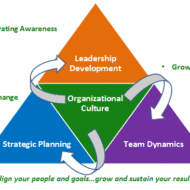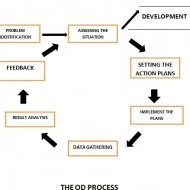Posted by Managementguru in Human Resource, Quotes and Quotes Only, Training & Development
on Jul 6th, 2014 | 0 comments

Popular HR Quotes by Industry Experts and Management Scholars We have compiled 50 top notch hr quotes from doyens in the field of business and management that will sure fire inspire you with creative ideas. 1. “Great Vision Without Great People Is Irrelevant.” -Jim Collins, Good To Great 2. “Human Resources Isn’t A Thing We Do. It’s The Thing That Runs Our Business.” -Steve Wynn, Wynn Las Vegas 3. “You Need To Have A Collaborative Hiring Process.” -Steve Jobs, Apple 4. “You Can’t Teach Employees To Smile. They Have To Smile Before You Hire Them.” -Arte Nathan, Wynn Las Vegas 5. “Never Hire Someone Who Knows Less Than You Do About What He’s Hired To Do.” -Malcolm Forbes, Forbes Top 50 HR Quotes 6. “When Hiring Key Employees, There Are Only Two Qualities To Look For: Judgement And Taste. Almost Everything Else Can Be Bought By The Yard.” John W. Gardner 7. “Recently, I Was Asked If I Was Going To Fire An Employee Who Made A Mistake That Cost The Company $600,000. No, I Replied, I Just Spent $600,000 Training Him. Why Would I Want Somebody To Hire His Experience?” -Thomas John Watson Sr., Ibm 8. “It’s More Than Just Selling Pizzas. It’s Being A Good Fit For The Community. We Hire Based On The Betterment Of The Community As Much As Anything.” -Mark Starr, David’s Pizza. 9. “You Can Have The Best Strategy And The Best Building In The World, But If You Don’t Have The Hearts And Minds Of The People Who Work With You, None Of It Comes To Life.” -Renee West, Luxor And Excalibur Hotel 10. “I am convinced that nothing we do is more important than hiring and developing people. At the end of the day you bet on people, not on strategies.” -Lawrence Bossidy, Ge CURRENT TRENDS IN HRD 11. “Do Not Hire A Man Who Does Your Work For Money, But Him Who Does It For The Love Of It.” -Henry David Thoreau, Life Without Principle 12. “If You Think Hiring Professionals Is Expensive, Try Hiring Amateurs” -Anonymous 13. “The Key For Us, Number One, Has Always Been Hiring Very Smart People.” -Bill Gates, Microsoft 14. “Time Spent On Hiring Is Time Well Spent.” -Robert Half 15. “I Hire People Brighter Than Me And Then I Get Out Of Their Way” -Lee Iacocca, Ford 16. “You Cannot Push Anyone Up The Ladder Unless He Is Willing To Climb.” -Andrew Carnegie 17. “Management Is Nothing More Than Motivating Other People.” -Lee Iacocca, Ford 18. “There Are Few, If Any, Jobs In Which Ability Alone Is Sufficient. Needed, Also, Are Loyalty, Sincerity, Enthusiasm And Team Play.” -William B. Given, Jr. 19. “When People Go To Work, They Shouldn’t Have To Leave Their Hearts At Home.” -Betty Bender 20. “One Machine Can Do The Work Of Fifty Ordinary Men. No Machine Can Do The Work Of One Extraordinary Man.” -Elbert Hubbard 21. “To Find Joy In Work Is To Discover The Fountain Of Youth.” -Pearl S. Buck 22. “One Of The Symptoms Of An Approaching Nervous Breakdown Is The Belief That One’s Work Is Terribly Important.” -Bertrand Russell 23. “Opportunity Is Missed By Most People Because It Is Dressed In Overalls And Looks Like Work.” -Thomas A. Edison 24. “Far And Away The Best Prize That Life Offers Is The Chance To Work Hard At Work Worth Doing.” -Theodore Roosevelt 25. ”Being Busy Does Not Always Mean Real Work. The Object Of All Work Is Production Or Accomplishment And To Either Of These Ends There Must Be Forethought, System, Planning, Intelligence, And Honest Purpose, As Well As Perspiration. Seeming To Do Is Not Doing.” -Thomas A. Edison 26. “Going To Work For A Large Company Is Like...

Posted by Managementguru in Business Management, Change management, Human Resource, Organisational behaviour, Principles of Management
on Mar 31st, 2014 | 0 comments

India often looks at Japanese or American models to comprehend the concepts of management. In reality, Indian scriptures can be considered as treasuries of management. The Bhagavat Gita, the Vedas and the Epics highlight the true spirit of working together and the need for de-stressing the self for enhanced performance levels. The idea of NISHKAMYAM (to perform one’s own work without expecting a result) is truly said to be the highest ideology preached by Lord Krishna. What Induces Stress? A dynamic condition in which an individual is presented with an opportunity or confronted with a demand, related to what she or he desires and for which the outcome is uncertain but important, can be called a stressful situation. The consequences of stress in an organizational set up express themselves in the form of physiological, psychological or behavioral symptoms, which are harmful to the individuals who experience high levels of stress. Symptoms of stress: AnxietyDepressionIncreased job dissatisfactionAbsenteeismDecline in productivityRapid turn overHigh blood pressureHeart diseasesHead aches Stress Can be Motivating: While long term stress is harmful to the individual and organization as well, it is said that short term stress serves the purpose of task accomplishment by individuals or groups, within the stipulated time. It serves as a motivation factor rather than a causative agent of frustration. It has been proved by scientists and medical researchers that stress has a direct effect on the metabolism of a person, that causes increase in heart and breathing rates, increase in blood pressure, thus inducing heart attacks. Equally important are the behavioral and attitudinal changes that are created by stress, which cannot be overlooked. Job Satisfaction: Psychological symptoms arise due to job-related dissatisfaction, boredom, work pressure, irritability and procrastination. Sometimes forceful involvement may also lead to decreased job satisfaction. The job to be carried out can be finished at the particular time if the individual is able to give one’s best shot. But when it is performed under stress, they complete the job with dissatisfaction. When the incumbent is asked to perform a task that lacks clarity, naturally ambiguity arises in his mind followed by anxiety. Behavioral Symptoms of Stress Changes in productivity levels, absence, and rapid staff turnover are stress symptoms of behavioral nature. It might be expressed even in the form of increased smoking, consumption of alcohol etc., Say for instance, in production department, when there is a need to supply a product in a very limited time, the workers may be active initially, but the performance slows down when they get totally tired or dissatisfied with the work. Again the demand by the superior adds additional stress that reaches unmanageable levels. Similarly, people taking care of administration, banking, marketing and other office related works fall a prey to stress. How to manage stress? From an organization view point, it is believed that a limited amount of stress may work wonders in terms of performance, with stress acting as a “positive stimulus”. But even low levels of stress are likely to be perceived as undesirable from an individual’s stand point. How could be the notion of management and individuals be different on the acceptable levels of stress? It does not solve the purpose. Individuals have to understand that, they have to live up to the expectations of the management in order to enhance their credit ratings, in terms of promotion and pay. They have to understand that challenges are to be perceived as opportunities to prove their mettle. Self and situational analysis, work analysis, time management and physical well- being are some techniques that practically solve problems of stress. “De-stressing the Self” Techniques for Employees Organisations can reduce stress of the employees...

Posted by Managementguru in Entrepreneurship, Human Resource, Organisational behaviour, Principles of Management, Training & Development
on Mar 31st, 2014 | 0 comments

Defining Organizational Culture Business is an integral part of the society; and it influences other elements of the social system, which in turn affect business. The entire sphere of business activities are influenced by the social structure and culture of a society. The social system is influenced by the way the business functions, innovations, transmission and diffusion of information and new ideas etc. Business activities have greatly influenced social attitudes, values, outlooks, customs and traits. However, it is very difficult and, in some cases, almost impossible to change many elements of the social environment in the short run. Hence, a business may have to anticipate and adapt to these uncontrollable external environments. Socio-cultural environment refers to the influence exercised by certain social factors, which are “beyond the company’s gate“. This includes attitude of people towards: Work Wealth Knowledge Family Marriage Religion Education Ethics and social responsibility of business. Belief System Influencing the Action: Culture is something that is evolved in a society over a long period and it represents the unified belief system of a large group of people. An organization can be distinguished from another by way of its culture, since organizational culture is unique in its perspective and methodology. When people from different social backgrounds are made to work under the same roof, a corporate organization acquires a distinct culture. Culture conveys a sense of identity for the organization. It facilitates the generation of commitment to do something noble than one’s own self-interest. Cultural Differences: As business go international, the need for understanding and appreciating cultural differences across countries is essential. Any move from one country to another will create a certain amount of confusion, disorientation and emotional upheaval. Especially, people form Asian countries that migrate to the west are subjected to what is called a “culture shock”, in terms of attitude, working style, language, way of life, dress codes and negotiating styles. Freshers may adapt to these changes quickly, since they are natural and easy to be trained. The problem arises with individuals who had been working under a totally different cultural setup from that of the new cultural environment; they will have to undergo the process of ‘unlearning‘, which is more like swapping old ideas for new ideas. This change process is what both the employees and the management find challenging; but ultimately what needs to be done has to be done. Culture Shock: Multi national and Trans national companies, which have business establishments in different parts of the world, must be prepared to cope with the culture shock. Since huge investments go into their projects, they have to think and analyze about the cultural and social aspects that have a definite impact on the working of organisations. For example, the work attitude of employees in the west might lay emphasis on services and results, oriented towards self-improvement; while that of the Asian counterparts may be patience and sacrifice rooted in emotions and loyalty. Business can be considered as a large social network serving to satisfy economic and social interests; culture acts as the social glue that helps hold the organization together by providing appropriate standards for the behavior of organization members. Slogans of Some Reputed Organizations in the Industry: Nokia: Connecting people Jet Airways: The joy of flying Reliance Industries: Growth is life Citibank: Your citi never sleeps The above cited examples give you a fair idea about what a particular company stands for. The orientation of these companies, expressed in the form of SLOGANS contributed to the successful conduct of their...

Posted by Managementguru in Business Management, Change management, Decision Making, Principles of Management, Training & Development
on Mar 31st, 2014 | 0 comments

Evaluating the Importance of Decision Making Successful decision making is one that is devoid of any ambiguity or tentativeness. Although there is a wide range of choice and alternative techniques to arrive at a decision, timely decision making is what adds value to the decision. The objective is to execute the action plan immediately to avoid delays that might prove costly in terms of productivity. Defensive behavior of managers: Managers who are the key figures to make decisions sometimes play defense to avoid action, blame or change. They exhibit a variety of defensive behaviors which is a wasted effort; this also makes the workers lethargic in their attitude. Avoiding action is considered to be the best political strategy. Some managers always talk about the rules and regulations that have been followed for ages in that company and want every action to be rigidly adhered to the precedence and neither allows nor admits the need to consider the nuances of a particular case. Policies and Procedures: Policies and procedures are of course the prerogative of the top level management, but it is the duty of the manager to suggest reforms in those policies that are obsolete by bringing it to the perusal of the ultimate authorities. How long will you sing the same song “The rules clearly state that”! Also don’t try to pass the buck or play duals, that clearly showcases your inability to handle things and nobody nowadays is prepared to believe false pretense. Expectation of Sub-Ordinates from the Superiors: Subordinates look up to their superiors for support as well as quick solutions for problems of any kind that comes their way; only a person who is quick in reacting to situations with presence of mind and consideration is well liked by and approved of. If you distance yourself from problems or try to prolong a task in lieu of your inability to make a decision, in the short run it might prove helpful in covering up making you look busy and productive. But what happens in the long run? It leads to organizational rigidity and stagnation in terms of productivity and a sag in the morale of the employees. Fifty Models for Strategic Thinking Playing it Safe is not Always Safe: Playing safe is not always safe. Some managers always like to lead a team that has taken up viable projects with a high probability of success. There is no pain but lots of gain. This tactics makes you devoid of risk taking -which according to me is the prime and supreme quality that a manager or a team leader must possess or at least try to develop. Also taking a neutral position in #conflict situations makes you a dull leader and not a person to be much sought after. What is the result of Poor Decision Making? The first and foremost thing that managers have to understand and admit is that, poor decision making is the root cause of failed course of action. They should have the guts to admit and take up the responsibility for the negative outcome and not to seek some strategically helpless defense mechanisms. Making others a scapegoat for your helplessness doesn’t shield you for long but puts you in the defending territory forever. Ddefensiveness delays decisions, affects organizational success, sets a bad precedence, increased group conflicts, interpersonal tensions and leads to unreliable evaluations. The long and short of the discussion clearly highlights the importance of recruiting not only a qualified manager but a committed and reliable person who has the ability to take risks and tackle crisis situations with ease and steer the organization smoothly without any hitches by greasing it...

Posted by Managementguru in Business Management, Change management, Human Resource, Organisational behaviour
on Mar 30th, 2014 | 0 comments

Integrated Organizational Development Organizational Development : in short OD, is a systematic, integrated and planned approach to improving enterprise effectiveness. Corporate firms can achieve success only when the available #resources are put to optimal use. Optimisation implies, deriving the best out of the limited or scarce resources. A firm is comprised of many departments, all of which compete for the same kind of resources and it becomes a tough proposition for the #management to allocate the resources suitably to different cost and #responsibility centers. The point is, changing needs of an organization has to be keenly observed by the management and if it senses a need for organizational development in any one of the disciplines, it should immediately employ appropriate #interventions to improve the #performance and #productivity. Culture – The Fundamental Aspect: Organizational development involves a paradigm shift in its culture, which is the fundamental aspect. It does not just mean finding solutions to problems. It is a process of managing change in an organization, resulting in behavioral changes in #employees for the good of the organization. Firms adopt different interventions to bring in changes in the behavior of employees through learning. The aim of introducing interventions would be to meet the short term and long term #objectives of the firm in an integrated fashion. Only when the employees are suitably appraised about the objectives and trained accordingly, their mindset gets tuned in to perform as per the expected standards. Intervention Techniques: Intervention techniques focus on shifting the individual’s focus from “me” to “us.” Before delving into the types of interventions, one might wonder why an organization needs to incorporate such interventions at the first place. The reasons may be attributed to the following: Some kinds of problems keep recurring to the surface. Even after solving a particular problem, another one of similar nature erupts. Productivity improvement techniques are not effective. Any amount of effort fails to yield the desired result. Employee morale is low and the top management is unable to pinpoint any particular reason for the undesired development. How to Overcome #Resistance from Employees’ End? Intervention techniques encourage employees to come out with suggestions and take part in decision making as well for the betterment of the organization. Though initially there might be a resistance to change, as it is natural for humans to resist change, gradually the workforce understands the importance of initializing the change that might have a direct bearing on them and their working environment. A holistic change is what is needed for an organization to rise as a whole to greater heights. #Group Training: Group training is a vehicle for individual change. It improves the listening skills, empathy, capability of being sensitive to fellow workers’ needs, interpersonal skills, and desired behavior in a social setup etc., Trainees selects the problem issues that are of interest to them, the setting being informal and unstructured and most interestingly there is no external force to structure the discussion. But it may be noted that the trainer interferes in extreme cases where the discussions turns out to be #counterproductive and destructive. #Survey Feedback: Survey feedback is another kind of intervention that gathers data from employees at different levels regarding the problem issues, through questionnaires and the feedback of the survey is analyzed by the top management to find the loopholes or bottlenecks hindering the development. This has been a popular organization development technique since time immemorial and still followed suit. These programs are useful in improving the #quality of work life and employee productivity. Analysis of the effectiveness of intervention programmes and evolving right research designs to measure the variables before and after the change, shall reveal the...










